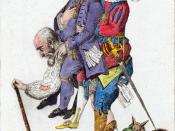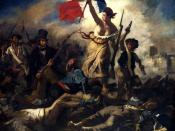There were 3 main causes of the French Revolution: Intellectual, Social and Political. Firstly, "Intellectual" causes of the revolution will be explained. Secondly, "Social" causes will be stated. Lastly, "Political" causes will be described.
There were several intellectual causes of the revolution. The idea of liberty was one of the obvious ones. The enlightenment spread the scientific and philosophical thought throughout the 18th century. This thoughts created the idea of liberty. Therefore, citizens became in the need of human rights/natural rights, the sovereignty of the citizens and equal rights for everybody under the law. Besides, the idea of the foundation of republic regarded as possible. Furthermore, "People can rebel against despotism", the idea appearing after the American Revolution was also a remarkable intellectual cause of the French Revolution.
The social causes of the revolution mostly united at one point, the estate system. This system consisted of three categories: First, Second and Third Estate.
The First Estate, The Clergy, formed 1% of population. They owned 10% of land. They had wealth, land, privileges and they levied tax, the tithe, upon the peasantry. However, there were also many poor clergymen in this Estate, and they supported the revolution against the wealthy clergymen later. In addition, The Second Estate, The Nobility, formed approximately 5% of population. They owned 20% of land. According to Norman Hampson, "Nobility could undertake large-scale farming, benefit from the steady increase in rents, speculate with large quantities of grain delivered as rents in kind, encourage the development of industry on their estates or exploit their mineral resources and profit from the long period of rising prices." They obviously had great wealth and taxed the peasantry as well as The Clergy. Beside these, The Third Estate formed approximately 95% of population. This estate subdivided into three groups: The Bourgeoisie,


![[Portrait of Louis Armstrong and Jack Teagarden, between 1938 and 1948] (LOC)](https://s.writework.com/uploads/4/45429/portrait-louis-armstrong-and-jack-teagarden-between-1938-an-thumb.jpg)